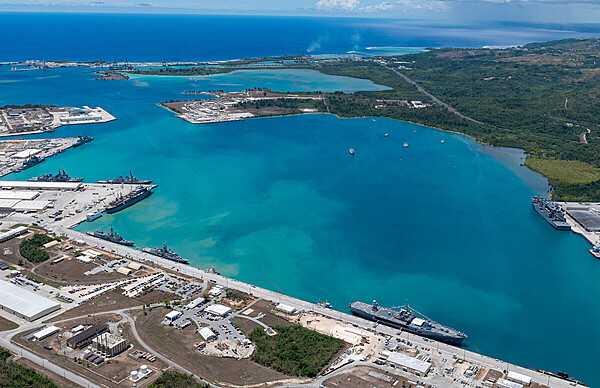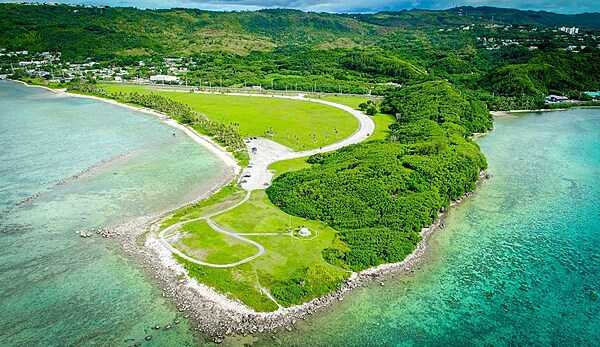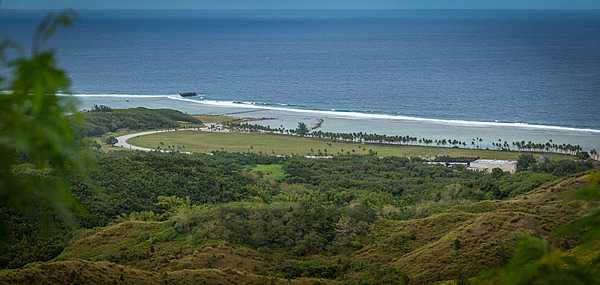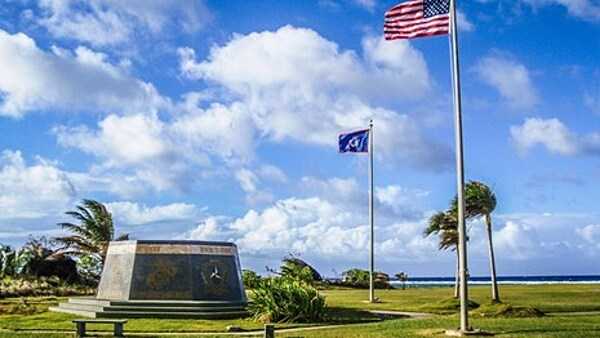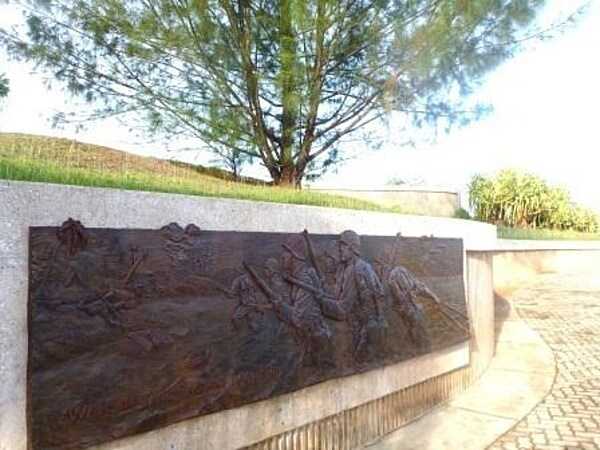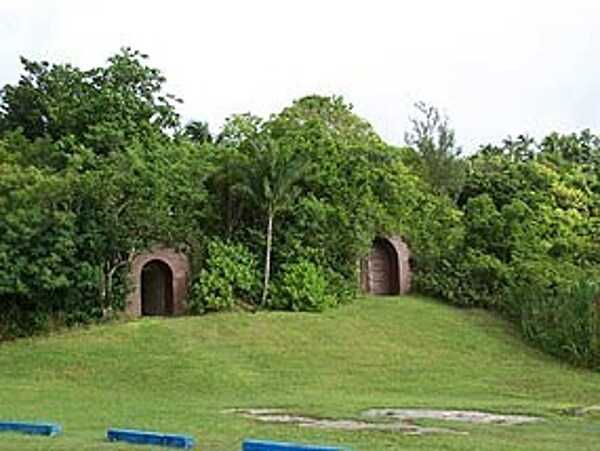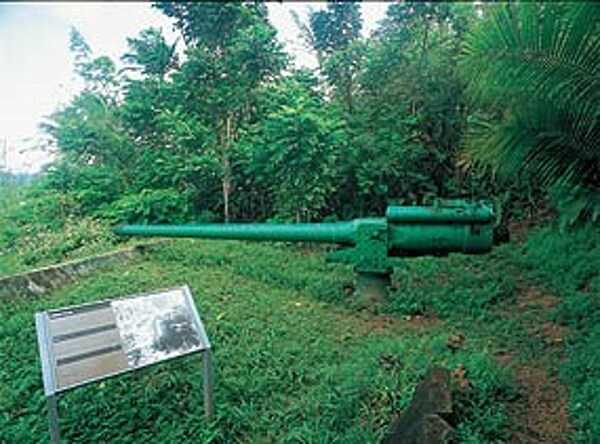Guam - GU - GUM - GUM - Australia and Oceania
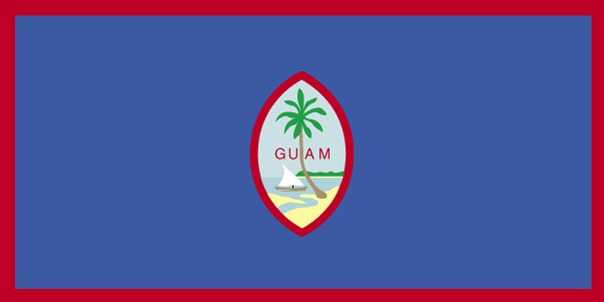
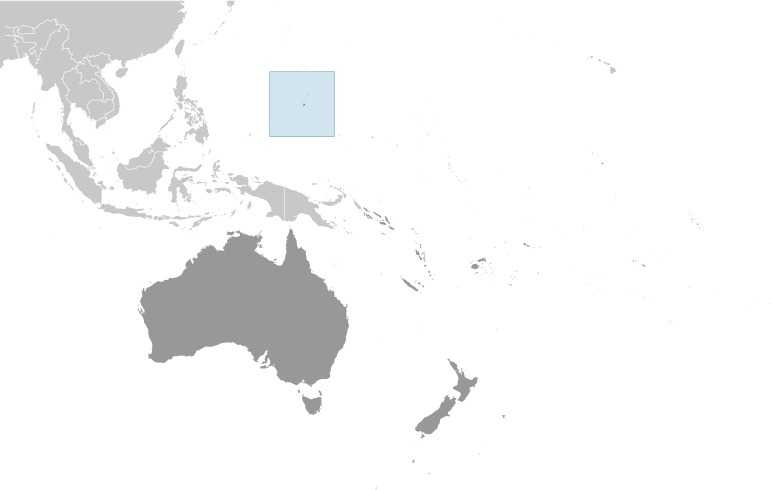
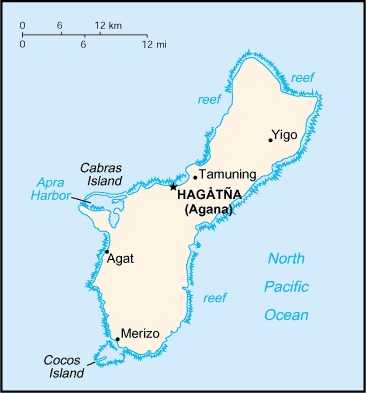
Guam Images
Guam Factbook Data
Dependency status
Diplomatic representation from the US
Age structure
15-64 years: 62.7% (male 55,591/female 50,741)
65 years and over: 10.9% (2024 est.) (male 8,615/female 9,814)
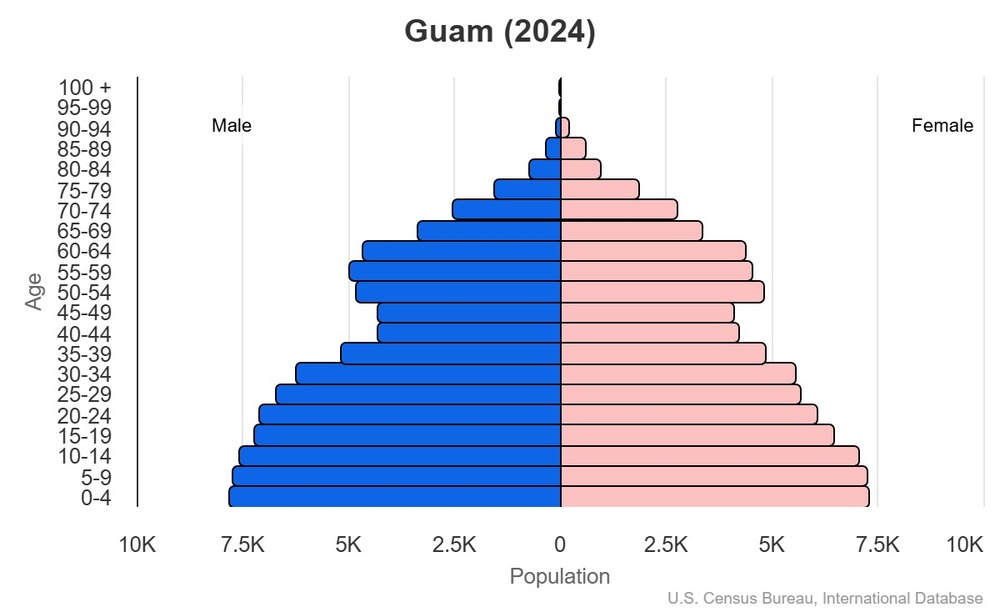
For additional information, please see the entry for Population pyramid on the Definitions and Notes page.
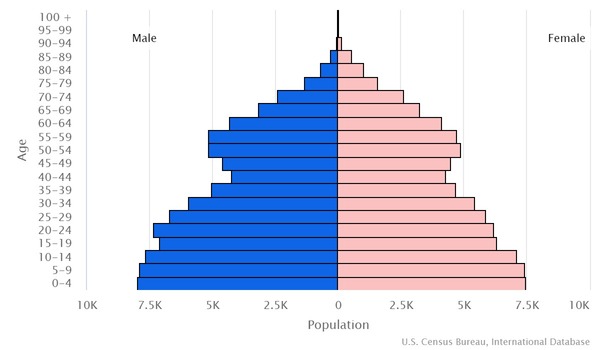
For additional information, please see the entry for Population pyramid on the Definitions and Notes page.
Geographic coordinates
Sex ratio
0-14 years: 1.07 male(s)/female
15-64 years: 1.1 male(s)/female
65 years and over: 0.88 male(s)/female
total population: 1.06 male(s)/female (2024 est.)
Natural hazards
Area - comparative
Background
Guam was settled by Austronesian people around 1500 B.C. These people became the indigenous Chamorro and were influenced by later migrations, including the Micronesians in the first millennium A.D., and island Southeast Asians around 900. Society was stratified, with higher classes living along the coast and lower classes living inland. Spanish explorer Ferdinand MAGELLAN was the first European to see Guam in 1521, and Spain claimed the island in 1565 because it served as a refueling stop for ships between Mexico and the Philippines. Spain formally colonized Guam in 1668. Spain’s brutal repression of the Chamorro, along with new diseases and intermittent warfare, reduced the indigenous population from more than 100,000 to less than 5,000 by the 1700s. Spain tried to repopulate the island by forcing people from nearby islands to settle on Guam and preventing them from escaping.
Guam became a hub for whalers and traders in the western Pacific in the early 1800s. During the 1898 Spanish-American War, the US Navy occupied Guam and set up a military administration. The US Navy opposed local control of government despite repeated petitions from the Chamorro. Japan invaded Guam in 1941 and instituted a repressive regime. During the US recapture of Guam in 1944, the island’s two largest villages were destroyed. After World War II, political pressure from local Chamorro leaders led to Guam being established as an unincorporated organized US territory in 1950, with US citizenship granted to all Chamorro. In a referendum in 1982, more than 75% of voters chose closer relations with the US over independence, although no change in status was made because of disagreements on the future right of Chamorro self-determination. The US military holds about 29% of Guam’s land and stations several thousand troops on the island. The installations are some of the most strategically important US bases in the Pacific; they also constitute the island’s most important source of income and economic stability.
Environmental issues
Exports - commodities
note: top export commodities based on value in dollars over $500,000
Exports - partners
note: top five export partners based on percentage share of exports
Agricultural products
Budget
expenditures: $1.299 billion (2016 est.)
Capital
geographic coordinates: 13 28 N, 144 44 E
time difference: UTC+10 (15 hours ahead of Washington, DC, during Standard Time)
etymology: the name Hagatna is derived from the Chamorro word haga, meaning "life's blood" and referring to the town's role as the center of government for the island
Imports - commodities
note: top five import commodities based on value in dollars
Climate
Coastline
Constitution
Exchange rates
Executive branch
head of government: Governor Lourdes LEON GUERRERO (since 7 January 2019)
cabinet: Cabinet appointed by the governor with the consent of the Legislature
election/appointment process: president and vice president indirectly elected on the same ballot by an Electoral College of electors chosen from each state to serve a 4-year term (eligible for a second term); under the US Constitution, residents of unincorporated territories, such as Guam, do not vote in elections for US president and vice president, but they can vote in Democratic and Republican presidential primary elections; governor and lieutenant governor elected on the same ballot by absolute majority vote in 2 rounds, if needed, for a 4-year term (eligible for 2 consecutive terms)
most recent election date: gubernatorial: 8 November 2022
election results:
2022: Lourdes LEON GUERRERO reelected governor; percent of vote - Lourdes LEON GUERRERO (Democratic Party) 55%, Felix CAMACHO (Republican Party) 44%; Josh TENORIO (Democratic Party) elected lieutenant governor
2018: Lourdes LEON GUERRERO elected governor; percent of vote - Lourdes LEON GUERRERO (Democratic Party) 50.7%, Ray TENORIO (Republican Party) 26.4%; Josh TENORIO (Democratic Party) elected lieutenant governor
expected date of next election: gubernatorial: 3 November 2026
Flag
meaning: blue stands for the sea and red for the blood shed in the fight against oppression; the central emblem is shaped like a Chamorro sling stone (a weapon for defense or hunting)
note: the US flag is the national flag
Independence
Industries
Judicial branch
judge selection and term of office: justices appointed by the governor and confirmed by the Guam legislature; justices appointed for life but subject to retention election every 10 years
subordinate courts: Superior Court of Guam (includes several divisions); US Federal District Court for the District of Guam (a US territorial court; appeals beyond this court are heard before the US Court of Appeals for the Ninth Circuit)
note: appeals beyond the Supreme Court of Guam are referred to the US Supreme Court
Land boundaries
Land use
arable land: 1.9% (2023 est.)
permanent crops: 13% (2023 est.)
permanent pasture: 14.8% (2023 est.)
forest: 52.4% (2023 est.)
other: 18% (2023 est.)
Legal system
Legislative branch
legislative structure: unicameral
number of seats: 15 (directly elected)
electoral system: plurality/majority
scope of elections: full renewal
term in office: 2 years
most recent election date: 11/8/2022
parties elected and seats per party: Democratic Party (9); Republican Party (6)
percentage of women in chamber: 40%
expected date of next election: November 2024
note: Guam directly elects 1 member by simple majority vote to serve a 2-year term as delegate to the US House of Representatives; the delegate can vote when serving on a committee and when the House meets as the Committee of the Whole House, but not when legislation is submitted for a “full floor” House vote
Maritime claims
exclusive economic zone: 200 nm
International organization participation
National holiday
Nationality
adjective: Guamanian
Natural resources
Geography - note
Economic overview
Political parties
Republican Party
Suffrage
note: Guamanians are US citizens but do not vote in US presidential elections
Terrain
Government type
Military - note
Country name
conventional short form: Guam
local long form: none
local short form: Guahan
abbreviation: GU
etymology: the native Chamorro name for the island, Guahan (meaning "we have"), was changed to Guam in the 1898 Treaty of Paris, when Spain relinquished Guam, Cuba, Puerto Rico, and the Philippines to the US
Location
Map references
Irrigated land
Diplomatic representation in the US
Internet users
Internet country code
GDP (official exchange rate)
note: data in current dollars at official exchange rate
Urbanization
rate of urbanization: 0.84% annual rate of change (2020-25 est.)
Broadcast media
Drinking water source
total: 99.7% of population (2022 est.)
unimproved:
total: 0.3% of population (2022 est.)
National anthem(s)
lyrics/music: Ramon Manalisay SABLAN [English], Lagrimas UNTALAN [Chamoru]/Ramon Manalisay SABLAN
history: adopted 1919; the local anthem is also known as "Guam Hymn"
_____
title: "The Star-Spangled Banner"
lyrics/music: Francis Scott KEY/John Stafford SMITH
history: official anthem, as a US territory; played before "Stand, Ye Guamanians"
Major urban areas - population
National symbol(s)
Population distribution
Electricity access
Sanitation facility access
total: 99.2% of population (2022 est.)
unimproved:
total: 0.8% of population (2022 est.)
Ethnic groups
Religions
Languages
Imports - partners
note: top five import partners based on percentage share of imports
Elevation
lowest point: Pacific Ocean 0 m
Military and security forces
Waste and recycling
percent of municipal solid waste recycled: 17.9% (2011 est.)
Civil aircraft registration country code prefix
Electricity generation sources
solar: 7.8% of total installed capacity (2023 est.)
wind: 0.1% of total installed capacity (2023 est.)
Petroleum
Gross reproduction rate
Currently married women (ages 15-49)
Ports
large: 0
medium: 1
small: 0
very small: 0
ports with oil terminals: 1
key ports: Apra Harbor
Average household expenditures
on alcohol and tobacco: 1.3% of household expenditures (2021 est.)
National color(s)
Labor force
note: number of people ages 15 or older who are employed or seeking work
Youth unemployment rate (ages 15-24)
male: 13.3% (2024 est.)
female: 14.1% (2024 est.)
note: % of labor force ages 15-24 seeking employment
Net migration rate
Median age
male: 29.6 years
female: 31.1 years
Total fertility rate
Unemployment rate
5.4% (2023 est.)
5.5% (2022 est.)
note: % of labor force seeking employment
Carbon dioxide emissions
from petroleum and other liquids: 1.819 million metric tonnes of CO2 (2023 est.)
Area
land: 544 sq km
water: 0 sq km
Airports
Infant mortality rate
male: 11 deaths/1,000 live births
female: 10.9 deaths/1,000 live births
Real GDP per capita
$35,200 (2015 est.)
$34,400 (2014 est.)
Broadband - fixed subscriptions
subscriptions per 100 inhabitants: 2 (2022 est.)
Energy consumption per capita
Death rate
Birth rate
Electricity
consumption: 1.715 billion kWh (2023 est.)
transmission/distribution losses: 90.023 million kWh (2023 est.)
Merchant marine
by type: other 3
Imports
$3.662 billion (2021 est.)
$3.388 billion (2020 est.)
note: GDP expenditure basis - imports of goods and services in current dollars
Exports
$193 million (2021 est.)
$379 million (2020 est.)
note: GDP expenditure basis - exports of goods and services in current dollars
Heliports
Life expectancy at birth
male: 75.6 years
female: 80.5 years
Real GDP growth rate
2.1% (2021 est.)
-10.5% (2020 est.)
note: annual GDP % growth based on constant local currency
Population growth rate
Telephones - mobile cellular
subscriptions per 100 inhabitants: 60 (2004 est.)
Dependency ratios
youth dependency ratio: 41.9 (2025 est.)
elderly dependency ratio: 18.1 (2025 est.)
potential support ratio: 5.5 (2025 est.)
Population
male: 87,448
female: 82,243
Telephones - fixed lines
subscriptions per 100 inhabitants: 43 (2022 est.)
